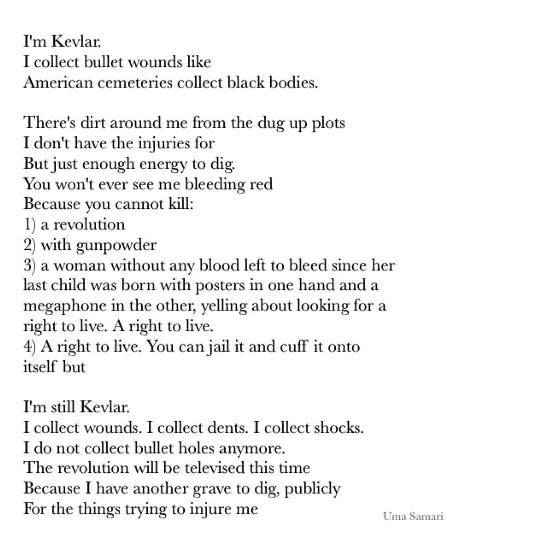
By Sayaspora
“Love yourself for all the Africa in you. Love yourself for all the black you possess. You are evidence that the sun can make itself at home in people and never forget to respect that.”
I met Uma Samari through Instagram and discovered through her writing an intelligent, assertive & unapologetically beautiful human being. I admire her for sharing her deepest truth & for constantly reminding me that sometimes it is okay, not to be okay. The topic of mental health, especially within black and African communities is one that is very dear to me. Through this conversation, my sharing of Uma’s work and my Artrepreneur tab, I am making central notions of mental health and self-care in our communities and hoping to make visible a part of me that has remained silent for too long.
UMA SAMARI: Being Canadian born to an African father and a Central American mother, finding stable footing in life has always been about identity for me. Growing up, I felt the conflict of having multiple layers, or labels, to my identity. Who was I? Was I Canadian? West African? Central American? If I couldn’t identify which cultural group I belonged to, I tried to figure what other places and spaces would make room for a person like me. At the end of the day, I determined that I was at least three things: female, Muslim, and black. It took a very long time to come to peace with these identities because society doesn’t make it easy to be any of these things but, they are all me. They are all me. In actuality, I needed to make sense of what each of these identities and identifiers mean to me personally and what place I dare to occupy in society. In order to do so, I started writing down my findings and my feelings about them. I wrote down my discoveries about womanhood, Islam, feminism, blackness, age, and biases that surround them. It was part of my growth and now, it is part of my struggle.
In recent years, I grew increasingly interested in personal development in attempt to better understand myself with the intention of growing into the woman I want to be. In my experience, any amount of personal development requires a certain amount of value to roots. In that regard, I looked into understanding my parents and their individual homelands. In the span of two years, I managed to make my way to my motherland and my fatherland. I made sure that the trips were done while I wore analytical and critical thinking lenses. The more I learned about each group, the closer I felt to each parent as a person, as an individual, as a blessing. Therefore, I try to incorporate that in my work as well.
SAYASPORA: Let me first thank you for doing this interview with me. You often speak of healing & self-care and their centrality in your life. As a black woman and especially an African woman, I have realized that discussions about mental health in my community were often either completely dismissed or totally avoided for various reasons. External and internal factors often box us into the “strong black women’’ trope and mental illnesses are often perceived as foreign and nonexistent in our communities. Have you had the same experience and if yes, how do you hope to advance the dialogue around mental health, wellness and self-care in black and African communities through your writing?
UMA SAMARI: Oh, the Strong Black Woman label is one of the worst labels we’ve been given. It makes it sound as if our struggles are not viable or real because we are strong enough to sustain any amount of pressure, which in turn becomes toxic to our hearts. I think by recognizing the amount of healing I constantly undergo, I am able to dismiss the ‘Strong Black Woman’ that was made of me and just be. It is a destructive title to hold because it makes light of serious problems that some of us may have. The recent year, for example, was a challenging one. It hurt to grow, be still, and let the branches of my life stretch, as they must. One thing that I had to come to terms with was that maybe sometimes, the weaknesses we experience are mental and there is nothing shameful about being the ‘Strong Black Woman on Hold’ or ‘Strong Black Woman Healing’. The true problem surfaces when we are denied the space within our identity to be anything but the ‘Strong Black Woman’ because, to be honest sometimes, we don’t want to be strong. Sometimes we want to wallow in our sadness, illness, weakness, or anything else that has taken the space of our ‘Strong’. And, that’s ok. It is fine. It is normal. We are black, we are women, and we are human. I try to remind everyone but mainly myself that that Strong Black Woman I am often named, is also unwell sometimes and she requires the love and decency that I am willing to pass on to anyone else. I make this a central theme in most things I write and most projects that I take on. This is how I am sure that this message of self-love, self-respect, and self-care reaches other people, mostly girls, who are given the weight of being ‘Strong’ to carry.
SAYASPORA Right. Our need for external support is also often perceived as unnecessary since we are supposed to be self-sufficient. Now, you are woman, black and Muslim. How do you navigate these three identities in a time where black, women and Muslim lives are often put aside? How did you make sense of these identities?
UMA SAMARI I think the navigation of identity is not something that ever becomes any clearer. I see women who are well settled into their womanhood, blackness, and Islam struggle, still, with what it means to be either, and that brings me reassurance. It justifies that being unable to navigate them all very well is part of the process. I fight with who I am. I fight to understand myself and my people. I learned that being black was a sin when I was 4 years old and mistreated for my skin colour. I learned that being Muslim was a sin when, on September 11, 2001, all the students from the Islamic school that I attended were sent home because we feared the attacks from bigots of the community. That same day my mother was target of many disrespectful stares and rude comments. I had always known that being a female was a sin, simply because of how the men and women in my community favored the male children. I think that since these three identities lost their innocence in my life in stages, I grieved each of them and their individuality.
It took me nearly two decades to stand firm in my belief in goodness to know that being black, Muslim, or woman could never be sinful in and of themselves. It took me years to unhate the things that I was…that I am. Right now, I don’t know what’s the hardest identity to wear because I wear my womanhood, my race, and my religion visibly. All I can say for sure that unlearning the hatred inflicted upon my consciousness was crucial in finding peace with the person I am.

SAYASPORA: Your poem ‘’You will not set yourself aflame this day” spoke to me. I saw it as an unapologetic declaration of self-love and acceptance. Can you tell us more about it?
UMA SAMARI: Yes, of course! I wrote this poem when I was having a very hard time. I was sitting on the floor of my bedroom in the dark and I was trying to cry myself back to sleep at 4 am. It was a sinister moment in my history that made me wish that I could just disappear into ash. I prayed, drank water, and fought through my battle long and well enough to find ways to calm down. This poem is a moment that I often relive to encourage the development and self-love that I’m journeying towards. Every time I read “You will not set yourself aflame this day,” I appreciate my growth more. It is a reminder that I am not the ashes I wished for, nor am I those flames. I am destined for much more and I will need to be good to myself in order to find out just what it means to live.

SAYASPORA: Right. You also often speak up about the value of black lives and your own blackness. Your poem ‘’What it Means’’ addresses just that. Can you tell us more about it?
UMA SAMARI: This poem is one that I have been working on for a few months. I started it June while I was in Ghana, after I visited a slave camp. Needless to say but crucial to remark, the slave camp was an utterly heart-devastating site to experience. It triggered a lot of questions about blackness and humanity as a whole and I needed to explore them. The poem being about my skin is just happenstance because my skin is my most obvious connection I have to my blackness. I planned on comparing blackness in Ghana, where a part of the African slave trade took place, to North American blackness, where we see the essence of being black, even when it has left the Continent. In Ghana and surely in other parts of West Africa, blackness is not a shackle like it can sometimes be in North America and other parts of the diaspora. Thus, I tried to create that parallel with the verses: “my skin is a complete sentence that closes itself onto Mondays like Sunday night sunsets” and “my skin is a complete sentence that closes itself like bar cells”. It is important to recognize how blackness has its freedoms in our homelands, at times. It gives us the hope and resilience we need to progress and be well within our own skins, within our black.
SAYASPORA: Again speaking of black lives, you’ve wrote several poems on the #blacklivesmatter. In your opinion, what place does art have or should have in our common fight for justice? And how are you using your platform to contribute to this revolutionary act of self-love.
UMA SAMARI: I think that #blacklivesmatter is a lesson my parents have been trying to teach me my whole life while the rest of the world expected me to prove that I was even worthy of being alive by expecting me to work twice, or sometimes three times as hard to even prove my existence is real. I grew up listening to revolutionaries and reading their biographies that outlined the struggles that black people had to undergo in order to attest that their lives, our lives, matter. The #blacklivesmatter is one of the most powerful movements of our times and it is not new to this generation. In actuality, many, if not most, of us learned about previous fights for black lives through the art our predecessors produced. I can only hope that my constant commentary on blackness makes its way to my children for them to learn about the weight of their black identity. Many people have fought for black, died for black, and died for being black. That’s no joke. If anything, it is a revolution. By using arts and other ways of documented history to teach me about blackness, my parents have managed to heed my need to learn about loving my black identity and through my means, I hope to impart the message that we are worthy enough to be loved by our Selves; we shouldn’t have to earn our personal love by working three times harder for it.

SAYASPORA: Can you tell us more about your photo-project kinfolk: of light and love? What drove you to start it and what was the process like?
UMA SAMARI: Kinfolk: of light and love was a marker of the victory of overcoming a big battle of months of being physically, emotionally, and mentally unwell. I had been very stressed as I went through a series of terrible circumstances over the past months. My trip to Ghana, which is where this photo-project took place, was a massive wake up call for me and it allowed me to mentally reset my goals and my life’s direction. To move forward and onwards, I crafted a project that demonstrated my promise to be happy. Kinfolk symbolizes the progress I’ve made because it inaugurated my move from my internal wars to a life of sheer and blinding light. In order to feel and see the light however, there’s darkness and that’s perfectly fine. That’s what I needed to understand.
This photo-project features exclusively my paternal grandmother’s grandchildren. My cousins and I are indication of her legacy and we are blessed to have each other. I decided to include the people I’ve photographed based on their cruciality in my journey towards the light. They showered me with love and it felt good to have blood so thick. My family, my cousins in particular, is responsible for improving my quality of life and this particular photo-project was my gratitude to them and to God for having put them in my life’s journey.
[perfectpullquote align=”full” cite=”” link=”” color=”” class=”” size=””] “I don’t know all the miracles of happenstance that made my existence possible but I’m so glad they happened. Despite the negligence of certain moments, life has been good to me, firms and responsible. I hereby declare my happiness. I declare that I am journeying to wellness. I declare that I will surround myself with light and I will make that my life. Since there is no light without darkness, I declare that I will embrace the dark. I declare that I will make my life personal.” [/perfectpullquote]
SAYASPORA: Lastly, what would you say to African and Black girls all around the world?
UMA SAMARI: Be good to your mother and love yourself. Love yourself for all the Africa in you. Love yourself for all the Black you possess. You are evidence that the Sun can make itself at home in people and never forget to respect that.
SAYASPORA: Beautiful. Thank you very much for having us today & best of luck in your projects!
Find more about Uma’s work on her
Instagram: @umizzles | Tumblr: umizzlesuncensored.tumblr.com | Purchase her most recent poetry book: Ina Kwana here





